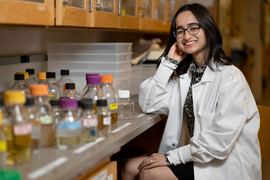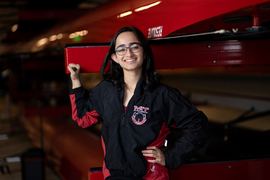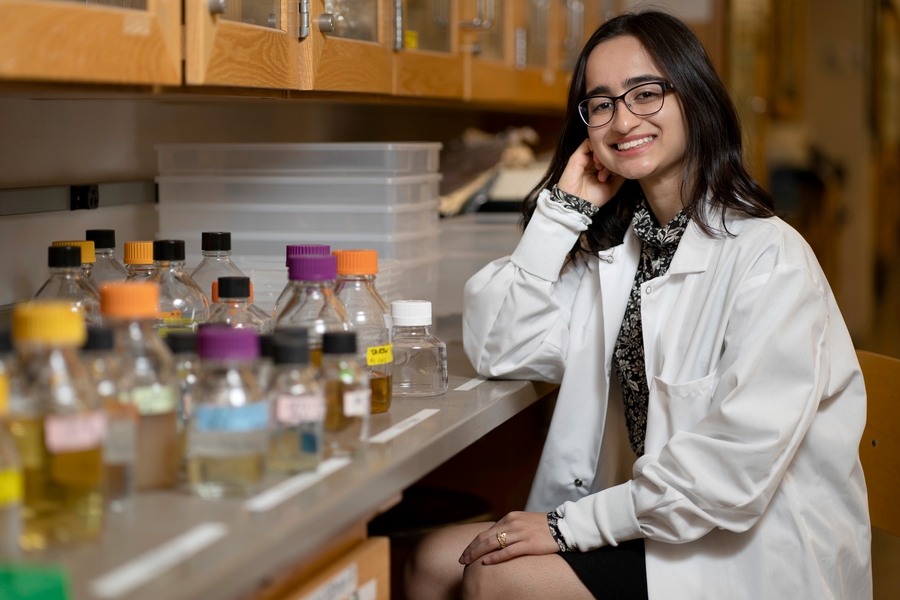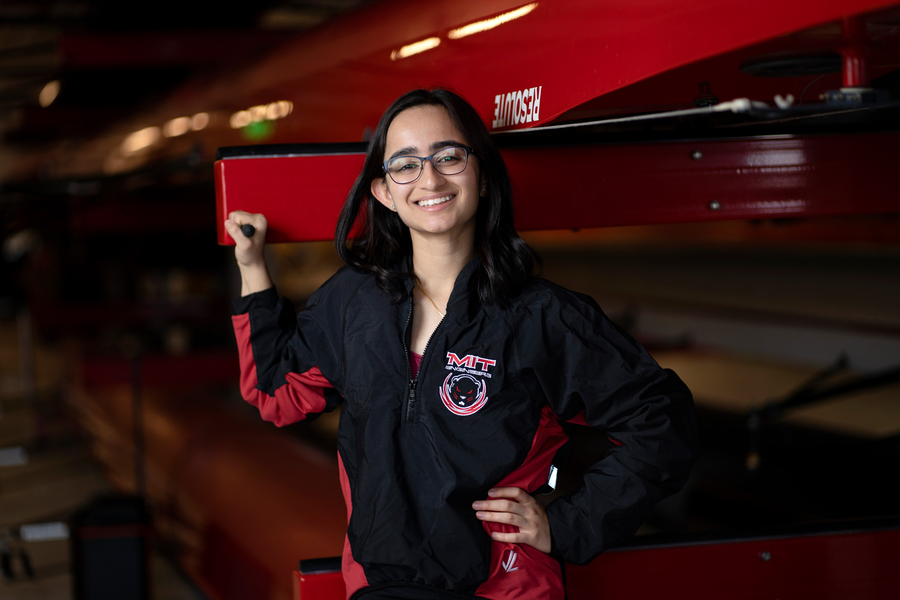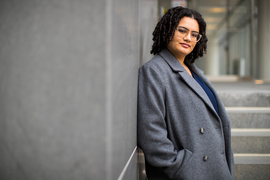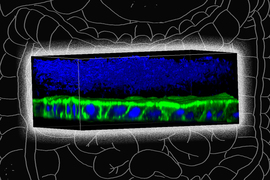“Five second rule!” her classmates shouted as they rushed to pick up some food they had dropped on the ground. At that moment, 10-year-old Isha Mehrotra knew what she wanted to do for the annual science fair.
After scouring the internet with her father, Mehrotra learned how to culture bacteria from home, first tossing food on the floor of her kitchen and swabbing samples onto agar plates — her very first microbiology project. She remembers presenting the data to her peers, watching their faces fall as they realized how much bacteria was on the food even after just five seconds. The experience kindled Mehrotra’s love of learning about the natural world, and more importantly, sharing that knowledge with others.
Now a senior studying biology, Mehrotra enjoys the investigative quality of science above all else.
“The more you study science, the more you realize what you don’t know about it,” she says.
MIT has also been a place for Mehrotra to learn more about herself. In the spring of her sophomore year, she worked in the lab of Alessio Fasano with Maureen Leonard at Massachusetts General Hospital’s Mucosal Immunology and Biology Research Center, investigating the blood microbiome of pediatric patients with an autoimmune condition called celiac disease — which Mehrotra herself was diagnosed with when she was a child.
Her diagnosis sparked an early interest in science and medicine. Today, she works to discover more about celiac, its causes, and effects on the individuals who have it, aiming for a future in which patients can be treated effectively or avoid getting the disease altogether.
Through her research experience, which has included publishing her work as a first author in the journal Current Research in Microbial Sciences, Mehrotra has learned that when presenting her findings, having faith in her work is half the battle, especially when challenging canonical scientific beliefs. “At the end of the day, you know, your data is your data. And presenting that with conviction and confidence is something that I’ve learned how to balance. I try to do that even when I’m acknowledging that there are various aspects of the work that have yet to be understood or validated,” she says.
Mehrotra also serves as a member on the Board of Directors at Boston Children’s Hospital Celiac Kids Connection, where she works to build a safe space for children with celiac. She understands firsthand the physical and emotional toll celiac disease can have, and values the opportunity to learn more about how to support people and navigate these challenges. For instance, she recognized the connection of food insecurity to celiac early on, as celiac is treated with a gluten-free diet. One of her most fulfilling projects, funded through the PKG Center at MIT, has been helping reduce gluten-free food insecurity exacerbated by the pandemic, working with a team at Children’s to research and mitigate these food access issues.
“It comes back to looking at things in different ways. How can I have a great impact in one area if I don’t consider all the various facets of it?” she asks.
In her classes, Mehrotra has also been drawn to complex public health topics with multiple perspectives, developing an anthropology background via her HASS coursework (for which she was named a Burchard Scholar) and an entrepreneurial framework by participating in MIT Sandbox. In January 2020, she took HST.434 (Evolution of an Epidemic), travelling to South Africa to study the evolution of the HIV/AIDS epidemic in the area. The experience was eye-opening for Mehrotra; she saw firsthand the variety of factors — social, political, biological — needed to approach a singular issue.
In June of last year, Mehrotra participated in the MIT Washington Summer Internship Program, where she worked for Gryphon Scientific, studying data to see how pandemics emerge and evolve at the biological level and what can be done at the policy level to prevent them. The experience allowed Mehrotra to see how different players can influence a singular problem.
“Social processes that underlie science and medicine are really important to me to continue studying,” she says.
On campus, Mehrotra has also been working as a mentor in her dormitory, Maseeh Hall, and peer tutor. During her first year she joined dynaMIT, a STEM outreach program for middle school students in Boston through which she taught biology in ways that made it more fun and accessible. She has also found ways to bring MIT biology students together as co-president of the Biology Undergraduate Student Assocation and to provide funding for on-campus initiatives as a board member of the Harvard-MIT Cooperative. Mehrotra also taught chemistry and biology to students in Wales through the Global Teaching Labs program and was a teaching assistant for the biology lab course 7.002 (Fundamentals of Experimental Molecular Biology) and for 7.012 (Introduction to Biology). While she understands that not all students are excited to take a required class such as 7.012, Mehrotra enjoys helping them engage with the content in meaningful ways.
“I just don’t see a better use of gaining knowledge than spreading it to other people,” she says.
Mehrotra is also a member of MIT’s women’s lightweight crew team. As the coxswain, she steers the boat and directs the other rowers both technically and motivationally during practices and races. She says the position has helped her develop her teamwork and leadership skills and allowed her to learn something new that she had never done before MIT. “It has been a great exercise in learning to be a leader and learning what I can do to support people even if I'm not experiencing exactly what they are, which is something I will have to do long term in my career as well,” she says.
Mehrotra will attend Stanford Medical School in the fall, with the goal of becoming a physician-scientist, dedicated to sharing knowledge, doing science, and interfacing with humanistic issues. Mehrotra wants to work directly with patients and researchers to solve medical issues, discovering new information and working with people who bring diverse perspectives. In the long run, she would like to start her own multidisciplinary research practice, where she envisions being able to see and treat patients some days a week, while also running a lab with different types of researchers, such as technical and social scientists.
For now, she is savoring the last few months of her time at MIT. “I’m happiest when I’m going around doing different things. It’s a shame I have to graduate now because there’s so much more to be done!” she says.
